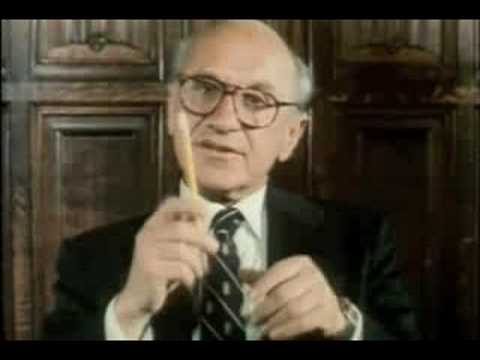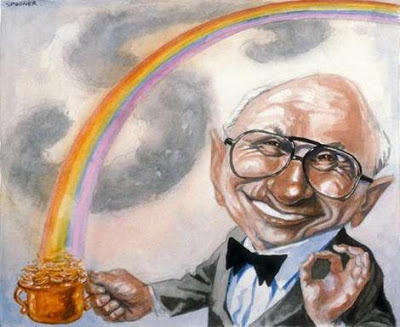Philosophy
 The roots of the idea of a free market can be traced back to the Scottish Enlightenment, but perhaps no scholar has done more to promulgate the Utopian dream of a free capitalistic society than the late and influential 20th century economist from the Chicago School of Economics, Milton Friedman.
The roots of the idea of a free market can be traced back to the Scottish Enlightenment, but perhaps no scholar has done more to promulgate the Utopian dream of a free capitalistic society than the late and influential 20th century economist from the Chicago School of Economics, Milton Friedman.
Inspired by the promise of political freedom in the Declaration of Independence, and the ideal of economic freedom articulated in Adam Smith's The Wealth of Nations, Friedman wholeheartedly believed that a prospering society is one which opens up economic opportunities to its citizens to freely pursue their goals and improve their lives. And if freedom is an ideal to be preserved, Friedman thought, then government regulation is to be opposed.
 The ideal of a truly free market is one that should give us pause, not necessarily because it is wrong or ill-conceived but because so much depends on it, and because the unintended consequences of such a doctrine in the real world are so difficult to foresee. Any absolutist position on this issue is likely to be premature and ill-informed.
The ideal of a truly free market is one that should give us pause, not necessarily because it is wrong or ill-conceived but because so much depends on it, and because the unintended consequences of such a doctrine in the real world are so difficult to foresee. Any absolutist position on this issue is likely to be premature and ill-informed.
In this first installment of his documentary series Free to Choose, Friedman introduces us to the practical and social benefits that the free market promises. The documentary is followed by a spirited debate with scholars and leaders of industry who provide fascinating angles through which to make sense of and analyze Friedman's ideas.
As an economist, Friedman saw the world through the filters of economic incentives and opportunities. One of the things he failed to consider, in my view, is that although a political system driven by the pursuit of capital maximization does tend to deliver the practical goods, it has the pernicious effects of changing the goals and expectations of those who engage in trade, and of measuring them exclusively by the standards of profit.
This downside, I think, is the erosion of the cultural framework, slowly changing our perception of each other as human beings to be treated with dignity and respect to that of instruments to be used for some ephemeral and utilitarian purpose... but that's just me. What do you think?
.
- Macroeconomics And Public Discourse
I've been struck by three things relating to our economic discourse lately. First, was the use of the term "socialist" in relation to Obama's econmic views during the campaign and since. Second and third are Alan Greenspan's testimony before...
- Bullshit Or Not: Milton Friedman Edition
In light of yesterday's post, let's play Bullshit or Not. There's an old sketch film called Amazon Women on the Moon and one of the bits is a parody of the old Leonard Nimoy show, "In Search Of..." called, "Bullshit or Not?" with the tagline...
- Planned Communities And Planned Economies
I was driving past one of those new upscale planned communities the other day and noting the irony that those who buy into the planned community are likely those who most strongly oppose a planned economy. Social engineering in one milieu is seen as desirable...
- Death And The Chilean Miracle
With a little time passed, it is probably worth thinking about the recent passings of Milton Friedman, Jeane Kirkpatrick, and Augusto Pinochet -- three figures who were part of shaping the legacy of Cold War era American conservativism. All three, of...
- Freedom Of Speech And Hate Speech
A very interesting post over at phronesisaical where Helmut is discussing legitimate boundaries to free speech. I think his argument is well-thought out and well worth a read, but since we brought up Austin yesterday, might as well keep on the roll. What...
Philosophy
Free to Choose - The Power of the Market
 The roots of the idea of a free market can be traced back to the Scottish Enlightenment, but perhaps no scholar has done more to promulgate the Utopian dream of a free capitalistic society than the late and influential 20th century economist from the Chicago School of Economics, Milton Friedman.
The roots of the idea of a free market can be traced back to the Scottish Enlightenment, but perhaps no scholar has done more to promulgate the Utopian dream of a free capitalistic society than the late and influential 20th century economist from the Chicago School of Economics, Milton Friedman.Inspired by the promise of political freedom in the Declaration of Independence, and the ideal of economic freedom articulated in Adam Smith's The Wealth of Nations, Friedman wholeheartedly believed that a prospering society is one which opens up economic opportunities to its citizens to freely pursue their goals and improve their lives. And if freedom is an ideal to be preserved, Friedman thought, then government regulation is to be opposed.
 The ideal of a truly free market is one that should give us pause, not necessarily because it is wrong or ill-conceived but because so much depends on it, and because the unintended consequences of such a doctrine in the real world are so difficult to foresee. Any absolutist position on this issue is likely to be premature and ill-informed.
The ideal of a truly free market is one that should give us pause, not necessarily because it is wrong or ill-conceived but because so much depends on it, and because the unintended consequences of such a doctrine in the real world are so difficult to foresee. Any absolutist position on this issue is likely to be premature and ill-informed.In this first installment of his documentary series Free to Choose, Friedman introduces us to the practical and social benefits that the free market promises. The documentary is followed by a spirited debate with scholars and leaders of industry who provide fascinating angles through which to make sense of and analyze Friedman's ideas.
As an economist, Friedman saw the world through the filters of economic incentives and opportunities. One of the things he failed to consider, in my view, is that although a political system driven by the pursuit of capital maximization does tend to deliver the practical goods, it has the pernicious effects of changing the goals and expectations of those who engage in trade, and of measuring them exclusively by the standards of profit.
This downside, I think, is the erosion of the cultural framework, slowly changing our perception of each other as human beings to be treated with dignity and respect to that of instruments to be used for some ephemeral and utilitarian purpose... but that's just me. What do you think?
.
- Macroeconomics And Public Discourse
I've been struck by three things relating to our economic discourse lately. First, was the use of the term "socialist" in relation to Obama's econmic views during the campaign and since. Second and third are Alan Greenspan's testimony before...
- Bullshit Or Not: Milton Friedman Edition
In light of yesterday's post, let's play Bullshit or Not. There's an old sketch film called Amazon Women on the Moon and one of the bits is a parody of the old Leonard Nimoy show, "In Search Of..." called, "Bullshit or Not?" with the tagline...
- Planned Communities And Planned Economies
I was driving past one of those new upscale planned communities the other day and noting the irony that those who buy into the planned community are likely those who most strongly oppose a planned economy. Social engineering in one milieu is seen as desirable...
- Death And The Chilean Miracle
With a little time passed, it is probably worth thinking about the recent passings of Milton Friedman, Jeane Kirkpatrick, and Augusto Pinochet -- three figures who were part of shaping the legacy of Cold War era American conservativism. All three, of...
- Freedom Of Speech And Hate Speech
A very interesting post over at phronesisaical where Helmut is discussing legitimate boundaries to free speech. I think his argument is well-thought out and well worth a read, but since we brought up Austin yesterday, might as well keep on the roll. What...
